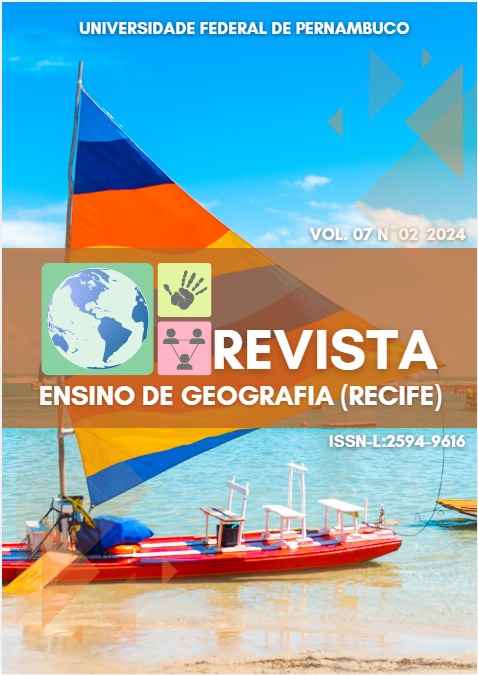Challenges and learnings in the integration of TDCIs in Geography education: case study in a public school in Garanhuns-PE
DOI:
https://doi.org/10.51359/2594-9616.2024.263632Keywords:
technological integration, digital information and communication technologies, geography teachingAbstract
Digital Information and Communication Technologies (DICTs) have transformed educational practices, offering new opportunities for teaching and learning. This study analyzes the challenges and learning outcomes of integrating DICTs into geography teaching, focusing on a public school in Garanhuns-PE. The research, based on phenomenology, investigates the perceptions of residents and students about the application of DICTs. The results show that the lack of adequate infrastructure, such as internet access and digital resources, represents a significant obstacle to the implementation of DICTs. However, various strategies have been adopted to overcome these limitations and promote active student participation. The research also highlights the importance of continuing teacher training to ensure effective integration of DICTs, emphasizing the need for specific skills and knowledge to use technologies in a critical and meaningful way. It concludes that integrating DICTs into geography teaching requires not only the availability of technological resources, but also an innovative and adaptive pedagogical approach, capable of transforming challenges into learning opportunities
References
AQUINO, D. T et al. Relato de experiência do PIBID: uso das tdic no ensino da geografia nos anos finais do ensino fundamental. In: PESSOA, C. F; SILVA, A. C. C (org.). Práticas pedagógicas inovadoras. Recife: EDUPE, 2023. p. 10-24.
ARRUDA, M. A. V.; COSTA, I. C. F.; MELO, J. A. B. Introdução das tecnologias da Informação e Comunicação (TDIC's) no ensino de Geografia. In: IX Encontro de Iniciação à Docência da UEPB, Paraíba. Anais [...]. EDIB/UEPB, 2023.
BRASIL. Base Nacional Comum Curricular. Brasília, DF: MEC, 2018.
GUERRA, F. F; BALBINO, C. A.S; MOREIRA, A. M. A. M. Tecnologias e currículo: impactos na prática educativa e no papel do professor. Plures Humanidades, v. 18, n. 1, 2017.
HUMMEL, E. I et al. Inovação e TDIC na educação: da formação à reflexão dos professores da educação básica. Ensino & Pesquisa, [S.L.], v. 22, n. 1, p. 103-115, Universidade Estadual do Paraná - UNESPAR, 2024.
MELO JÚNIOR, A. L; MORAIS, R. Estudo de caso como estratégia de investigação qualitativa em educação. Ensaios Pedagógicos, Sorocaba, v. 2, n. 1, p. 26-33, 2018.
MINAYO, M. C. S. Análise qualitativa: teoria, passos e fidedignidade. Ciência & saúde coletiva, v. 17, p. 621-626, 2012.
OLIVEIRA, J. A. Inclusão digital: a percepção dos professores sobre a utilização das tecnologias de informação e comunicação (TIC) no ensino da geografia. 2018. Tese de Doutorado. Universidade Fernando Pessoa (Portugal).
SANTOS, S. M. A. V et al. O uso das Tecnologias Digitais da Informação e Comunicação (TDICS) na escola contemporânea. Contribuciones A Las Ciencias Sociales, [S.L.], v. 17, n. 1, p. 4586-4600, 2024.
SILVA, A. C. M; GEHRES, A. F; CAMINHA, I. O. O método fenomenológico como possibilidade para a pesquisa em Educação Física. Revista Pesquisa Qualitativa, v. 11, n. 27, p. 584-604, 2023.
STÜRMER, A. B. As tic’s nas escolas e os desafios no ensino de geografia na educação básica. GEOSABERES: Revista de Estudos Geoeducacionais, v. 2, n. 4, p. 3-12, 2011.
Downloads
Published
How to Cite
Issue
Section
License
Copyright (c) 2024 Eanes Porto Lima, Ailson Barbosa da Silva

This work is licensed under a Creative Commons Attribution 4.0 International License.
Authors who publish with this journal agree to the following terms:- Authors retain copyright and grant the REVISTA ENSINO DE GEOGRAFIA (RECIFE) right of first publication with the work simultaneously licensed under a Creative Commons Attribution NonCommercial International 4.0 (CC BY-NC) that allows others to share the work with an acknowledgement of the work's authorship and initial publication in this journal.
- Authors are able to enter into separate, additional contractual arrangements for the non-exclusive distribution of the journal's published version of the work (e.g., post it to an institutional repository or publish it in a book), with an acknowledgement of its initial publication in this journal.
- Authors are permitted and encouraged to post their work online (e.g., in institutional repositories or on their website) prior to and during the submission process, as it can lead to productive exchanges, as well as earlier and greater citation of published work.



